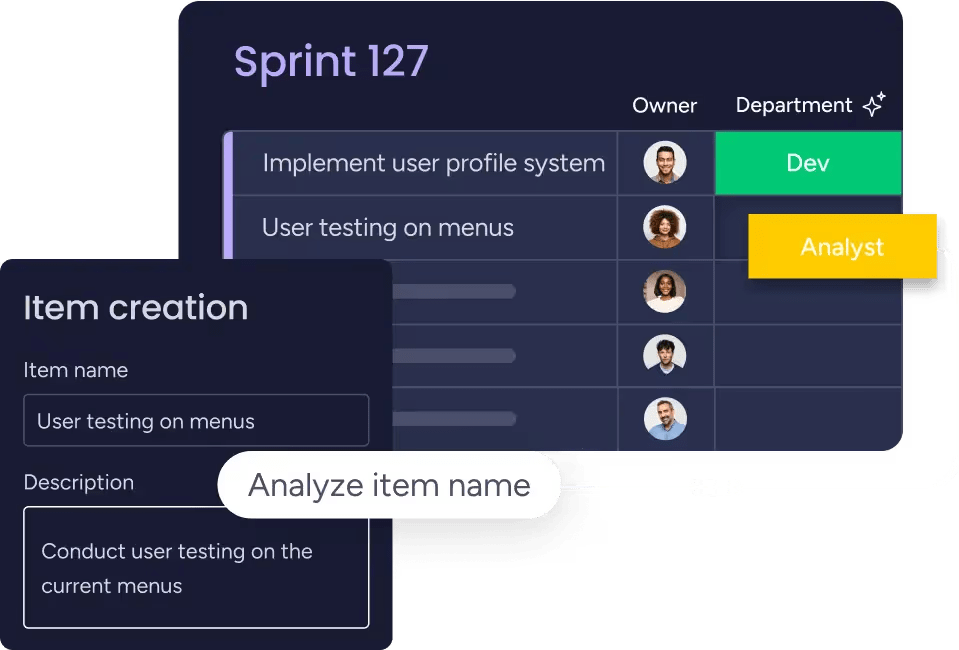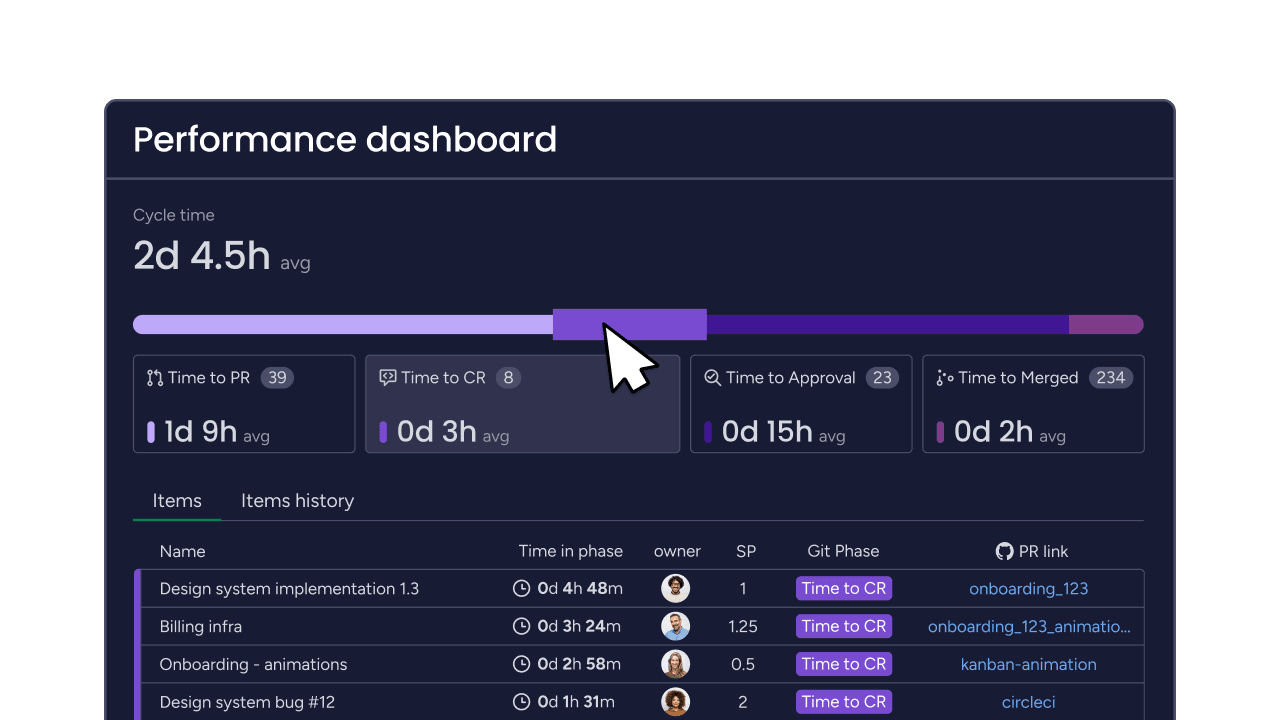Agile teams are rapidly embracing AI to elevate their ways of working and drive business impact. With automation and smart analytics, AI helps teams streamline processes, forecast outcomes, and adapt faster. From sprint planning to retrospectives, every Agile workflow can benefit from AI-powered insights and digital assistance.
In this guide, you’ll discover the top AI platform categories, practical implementation strategies, and monday dev’s latest capabilities for accelerating Agile transformation.
Try monday devKey takeaways
- AI enables Agile teams to automate repetitive tasks, forecast outcomes, and iterate faster for continuous improvement.
- Strategic adoption of AI transforms workflows, improves collaboration, and drives measurable business impact.
- Overcoming AI adoption challenges requires clear communication, phased rollouts, and focused training.
- Integrating essential AI platform types — like sprint planning assistants, code review automation, and workflow optimization — ensures holistic Agile transformation.
- Using monday dev empowers teams with customizable AI blocks, real-time analytics, and built-in compliance for secure, adaptable Agile practices.
How AI transforms Agile team performance
AI addresses key Agile pain points such as time-consuming backlog refinement and sprint estimation, freeing teams to focus more on creating value. It enhances Agile team performance by automating routine tasks, enabling faster decision-making through predictive analytics, and enhancing collaboration across distributed teams.
Unlocking these capabilities allows Agile teams to focus more on strategic innovation and creative problem-solving while maintaining rapid iterations and consistently high product quality. AI-driven insights also improve risk detection, resource allocation, and retrospective analysis, making processes more adaptive and outcomes more predictable.
5 high-impact AI applications for Agile teams
Here are 5 high-impact AI tools for developers for Agile teams:
- AI-powered sprint planning: AI analyzes historical data and team velocity to automate sprint planning, suggesting optimal workloads and forecasting delivery timelines for accurate release cycles.
- Intelligent backlog management: Machine learning algorithms categorize, prioritize, and groom backlog items, reducing manual effort while ensuring high-value tasks are addressed first.
- Automated testing and bug detection: AI tools generate and execute test cases automatically, flagging bugs in code early and suggesting fixes — resulting in faster feedback loops and higher code quality.
- Real-time performance monitoring and analytics: Advanced AI tracks key project metrics, resource allocation, team output, and sentiment, delivering actionable insights and highlighting bottlenecks to drive continuous improvement.
- Enhanced collaboration and communication: AI-powered chatbots streamline communication by answering FAQs, updating progress, and facilitating cross-team collaboration, freeing humans to focus on complex problem-solving.
Overcoming AI adoption challenges in Agile
Agile teams face several challenges when adopting AI, including resistance to change, skill gaps, complex integration, and data silos. But teams can overcome them by following these practical strategies and choosing right platform support.
Resistance to change
Change brings uncertainty, so leaders must clearly communicate AI’s benefits, set realistic expectations, and involve team members at every stage. Engaging teams in pilot projects fosters trust and demonstrates value before scaling AI across more teams and processes.
Skill and knowledge gaps
Skill gaps are common in AI adoption. Upskilling current employees through focused training and peer learning helps teams feel confident and competent. With monday dev’s user-friendly AI features, non-technical users can build and manage automations with minimal learning curves.
Phased implementation and scaling
Rolling out AI gradually allows teams to target one workflow at a time, learn from early results, and quickly resolve challenges. Pilot projects offer controlled environments to test integrations and build momentum for wider adoption.
Complex integrations and data silos
AI relies on data quality. Teams should break down silos by integrating tools and making data accessible across teams, using platforms like monday dev that connect sources and automate data flow.
Culture and continuous improvement
An innovation-friendly culture encourages feedback, rewards learning, and supports continuous improvement. Agile teams should use retrospectives to refine their AI implementation, highlighting wins and lessons learned.
6 essential types of AI platforms every Agile team needs
Agile teams benefit from a blend of AI platform types, each solving a key aspect of modern software delivery and collaboration. Here’s a quick comparison table of essential AI platform types for Agile teams, summarizing their main function, features, and use cases:
| Platform type | Main function | Key features | Use case | Best for |
|---|---|---|---|---|
| Sprint planning and estimation | Automate and optimize sprint setup | Predictive workload analysis, risk detection, dependency mapping | Planning sprints efficiently and forecasting delivery timelines | Teams optimizing sprint predictability |
| Workflow automation and optimization | Streamline team operations | No-code automation, process mapping, real-time analytics | Reducing manual effort and accelerating repetitive tasks | Cross-functional teams scaling efficiency |
| Code review and quality assurance | Improve code quality and security | AI-driven bug detection, code smell spotting, automated security scans | Ensuring reliable code and early issue detection for development teams | Dev teams improving release quality |
| Collaboration and delivery enablement | Enhance team communication | AI chatbots, automated meeting notes, intelligent task assignment | Aligning distributed teams and expediting communication | Distributed teams improving coordination |
| Backlog and user story management | Support backlog grooming and story creation | Ticket summarization, story generation, prioritization tools | Helping product owners manage priorities and backlog items | Agile squads improving story management |
| Knowledge and documentation management | Organize and retrieve team knowledge | AI-powered search, document summarization, onboarding assistance | Consolidating information for onboarding and rapid knowledge-sharing | Teams onboarding or scaling rapidly |
Each platform type addresses a critical Agile need, enabling teams to work smarter, adapt faster, and deliver more value.
Implementing AI in your Agile processes: a 7-step framework
Follow this practical 7-step framework for implementing AI in your Agile processes with clear stages to maximize impact, minimize risk, and foster continuous improvement.
Step 1. Define problems and objectives
Start by identifying specific team challenges or goals that AI can address, aligning AI solutions with organizational and project priorities.
Step 2. Assess data and team readiness
Review data quality, accessibility, and employee willingness to adopt AI. Ensure you establish foundational Agile principles and cross-functional skills.
Step 3. Select the right AI platforms and tools
Choose platforms with integrated AI that best fit prioritized use cases — such as sprint planning, workflow automation, code review, or backlog management — and consider scalability and integration.
Step 4. Integrate AI incrementally
Embed AI capabilities into existing Agile workflows through pilot projects or phased rollouts. Connect AI to live data sources for real-time context and seamless adoption. When adding AI in Agile project management, prioritize tools that integrate with GitHub, Jira, and Slack.
Step 5. Foster transparency and collaboration
Document AI inputs, outputs, and context sources for the team. Show how you make recommendations and keep collaboration central.
Step 6. Inspect, adapt, and measure value
Apply Agile’s inspect-and-adapt cycle: review AI contributions often, gather feedback, and iterate based on lessons learned. Track value metrics — like time saved, improved accuracy, or faster cycle times — to ensure AI delivers tangible benefits.
Step 7. Scale and govern AI
Once validated, expand AI adoption across more processes and teams, while implementing transparent governance, compliance checks, and ongoing learning loops.
Platforms like monday dev support every implementation stage by providing modular AI features, customizable automations, and robust reporting for Agile teams seeking dependable transformation.
Try monday devWhen AI shouldn’t replace human judgment
As teams integrate AI more deeply into their Agile workflows, it’s equally important to recognize where technology should support — not replace — human expertise.
AI should never replace human judgment in areas demanding creativity, ethical decision-making, empathy, or deep contextual understanding. Humans excel at nuanced decisions in complex or ambiguous situations, guiding AI outputs and ensuring alignment with values and stakeholder needs.
In Agile, leadership, conflict resolution, and ethical choices require emotional intelligence and experience — attributes AI lacks and which are critical for team culture, innovation, and trust.
Ultimately, AI works best as an assistant, amplifying human expertise while leaving final decisions and adaptation in the hands of people.
How monday dev accelerates AI-powered Agile transformation
After defining a clear AI implementation roadmap, the next step is choosing a platform that actually supports it. Built on monday.com Work OS, monday dev brings AI and Agile together in one intuitive workspace, turning Agile strategy into execution without disrupting team flow.
Instead of managing AI through disconnected plugins or scripts, teams can embed intelligence directly into every stage of the development lifecycle: from backlog refinement to sprint planning, QA, and release management. With monday dev’s modular AI blocks, you can automate repetitive tasks, surface real-time insights, and keep teams aligned across functions — all while maintaining full control and compliance.

Key ready-made AI capabilities in monday dev include:
- Complete ownership: Build and adapt Agile workflows with no-code AI blocks.
- Seamless integration: Align engineering, product, and business teams within one platform.
- Data-driven decisions: Use predictive analytics and real-time dashboards to stay proactive.
- Enterprise-grade compliance: Maintain governance and security across regulated environments.
Together, these capabilities create a system that not only supports AI adoption but also accelerates Agile transformation. Teams can run pilot projects, scale automations, and visualize impact faster than ever.

Try monday dev free for 14 days and start experimenting with AI in your Agile workflows to see how it can elevate your team’s performance.
Try monday devFAQs
Will AI replace Agile coaches?
AI won’t replace Agile coaches. Instead, it acts as a force multiplier, offering data-driven insights and automating routine tasks. Human coaches remain essential for mentoring, conflict resolution, and driving cultural change—skills that current AI cannot replicate.
What's the typical cost of AI tools for Agile teams?
Most modern AI tools for Agile teams, including monday dev, offer free trials and flexible paid tiers. Standard pricing often starts at around $7–$15 per user/month, while enterprise features and add-ons may require custom quotes. Additional AI credits can be purchased for platforms like monday dev as needs grow.
How quickly can teams see results from AI adoption?
Agile teams usually observe notable improvements in efficiency and quality within the first 2–8 weeks of implementing AI tools. A Harvard Business School Study of Procter & Gamble shows productivity can rise by 12–16% and routine documentation time may decrease by up to 70%. [Source: https://papers.ssrn.com/sol3/papers.cfm?abstract_id=5188231].
Which AI capabilities work best for distributed Agile teams?
AI features such as automated sprint planning, instant sentiment analysis, resource allocation, digital onboarding assistants, and real-time board updates are especially valuable for distributed teams. Platforms such as monday dev provide cross-team visibility and workflow automations that support remote collaboration and alignment.
How do AI tools handle compliance requirements in regulated industries?
AI platforms designed for enterprise, such as monday dev, offer advanced compliance and data security features. Automated monitoring, customized audit trails, and proactive risk alerts help Agile teams meet strict regulatory requirements while protecting sensitive information.

